Dongchan Shin
OpenCUA: Open Foundations for Computer-Use Agents
Aug 12, 2025Abstract:Vision-language models have demonstrated impressive capabilities as computer-use agents (CUAs) capable of automating diverse computer tasks. As their commercial potential grows, critical details of the most capable CUA systems remain closed. As these agents will increasingly mediate digital interactions and execute consequential decisions on our behalf, the research community needs access to open CUA frameworks to study their capabilities, limitations, and risks. To bridge this gap, we propose OpenCUA, a comprehensive open-source framework for scaling CUA data and foundation models. Our framework consists of: (1) an annotation infrastructure that seamlessly captures human computer-use demonstrations; (2) AgentNet, the first large-scale computer-use task dataset spanning 3 operating systems and 200+ applications and websites; (3) a scalable pipeline that transforms demonstrations into state-action pairs with reflective long Chain-of-Thought reasoning that sustain robust performance gains as data scales. Our end-to-end agent models demonstrate strong performance across CUA benchmarks. In particular, OpenCUA-32B achieves an average success rate of 34.8% on OSWorld-Verified, establishing a new state-of-the-art (SOTA) among open-source models and surpassing OpenAI CUA (GPT-4o). Further analysis confirms that our approach generalizes well across domains and benefits significantly from increased test-time computation. We release our annotation tool, datasets, code, and models to build open foundations for further CUA research.
AgentRewardBench: Evaluating Automatic Evaluations of Web Agent Trajectories
Apr 11, 2025



Abstract:Web agents enable users to perform tasks on web browsers through natural language interaction. Evaluating web agents trajectories is an important problem, since it helps us determine whether the agent successfully completed the tasks. Rule-based methods are widely used for this purpose, but they are challenging to extend to new tasks and may not always recognize successful trajectories. We may achieve higher accuracy through human evaluation, but the process would be substantially slower and more expensive. Automatic evaluations with LLMs may avoid the challenges of designing new rules and manually annotating trajectories, enabling faster and cost-effective evaluation. However, it is unclear how effective they are at evaluating web agents. To this end, we propose AgentRewardBench, the first benchmark to assess the effectiveness of LLM judges for evaluating web agents. AgentRewardBench contains 1302 trajectories across 5 benchmarks and 4 LLMs. Each trajectory in AgentRewardBench is reviewed by an expert, who answers questions pertaining to the success, side effects, and repetitiveness of the agent. Using our benchmark, we evaluate 12 LLM judges and find that no single LLM excels across all benchmarks. We also find that the rule-based evaluation used by common benchmarks tends to underreport the success rate of web agents, highlighting a key weakness of rule-based evaluation and the need to develop more flexible automatic evaluations. We release the benchmark at: https://agent-reward-bench.github.io
Spider 2.0: Evaluating Language Models on Real-World Enterprise Text-to-SQL Workflows
Nov 12, 2024



Abstract:Real-world enterprise text-to-SQL workflows often involve complex cloud or local data across various database systems, multiple SQL queries in various dialects, and diverse operations from data transformation to analytics. We introduce Spider 2.0, an evaluation framework comprising 632 real-world text-to-SQL workflow problems derived from enterprise-level database use cases. The databases in Spider 2.0 are sourced from real data applications, often containing over 1,000 columns and stored in local or cloud database systems such as BigQuery and Snowflake. We show that solving problems in Spider 2.0 frequently requires understanding and searching through database metadata, dialect documentation, and even project-level codebases. This challenge calls for models to interact with complex SQL workflow environments, process extremely long contexts, perform intricate reasoning, and generate multiple SQL queries with diverse operations, often exceeding 100 lines, which goes far beyond traditional text-to-SQL challenges. Our evaluations indicate that based on o1-preview, our code agent framework successfully solves only 17.0% of the tasks, compared with 91.2% on Spider 1.0 and 73.0% on BIRD. Our results on Spider 2.0 show that while language models have demonstrated remarkable performance in code generation -- especially in prior text-to-SQL benchmarks -- they require significant improvement in order to achieve adequate performance for real-world enterprise usage. Progress on Spider 2.0 represents crucial steps towards developing intelligent, autonomous, code agents for real-world enterprise settings. Our code, baseline models, and data are available at https://spider2-sql.github.io.
OSWorld: Benchmarking Multimodal Agents for Open-Ended Tasks in Real Computer Environments
Apr 11, 2024



Abstract:Autonomous agents that accomplish complex computer tasks with minimal human interventions have the potential to transform human-computer interaction, significantly enhancing accessibility and productivity. However, existing benchmarks either lack an interactive environment or are limited to environments specific to certain applications or domains, failing to reflect the diverse and complex nature of real-world computer use, thereby limiting the scope of tasks and agent scalability. To address this issue, we introduce OSWorld, the first-of-its-kind scalable, real computer environment for multimodal agents, supporting task setup, execution-based evaluation, and interactive learning across various operating systems such as Ubuntu, Windows, and macOS. OSWorld can serve as a unified, integrated computer environment for assessing open-ended computer tasks that involve arbitrary applications. Building upon OSWorld, we create a benchmark of 369 computer tasks involving real web and desktop apps in open domains, OS file I/O, and workflows spanning multiple applications. Each task example is derived from real-world computer use cases and includes a detailed initial state setup configuration and a custom execution-based evaluation script for reliable, reproducible evaluation. Extensive evaluation of state-of-the-art LLM/VLM-based agents on OSWorld reveals significant deficiencies in their ability to serve as computer assistants. While humans can accomplish over 72.36% of the tasks, the best model achieves only 12.24% success, primarily struggling with GUI grounding and operational knowledge. Comprehensive analysis using OSWorld provides valuable insights for developing multimodal generalist agents that were not possible with previous benchmarks. Our code, environment, baseline models, and data are publicly available at https://os-world.github.io.
OpenAgents: An Open Platform for Language Agents in the Wild
Oct 16, 2023



Abstract:Language agents show potential in being capable of utilizing natural language for varied and intricate tasks in diverse environments, particularly when built upon large language models (LLMs). Current language agent frameworks aim to facilitate the construction of proof-of-concept language agents while neglecting the non-expert user access to agents and paying little attention to application-level designs. We present OpenAgents, an open platform for using and hosting language agents in the wild of everyday life. OpenAgents includes three agents: (1) Data Agent for data analysis with Python/SQL and data tools; (2) Plugins Agent with 200+ daily API tools; (3) Web Agent for autonomous web browsing. OpenAgents enables general users to interact with agent functionalities through a web user interface optimized for swift responses and common failures while offering developers and researchers a seamless deployment experience on local setups, providing a foundation for crafting innovative language agents and facilitating real-world evaluations. We elucidate the challenges and opportunities, aspiring to set a foundation for future research and development of real-world language agents.
Leveraging Non-dialogue Summaries for Dialogue Summarization
Oct 17, 2022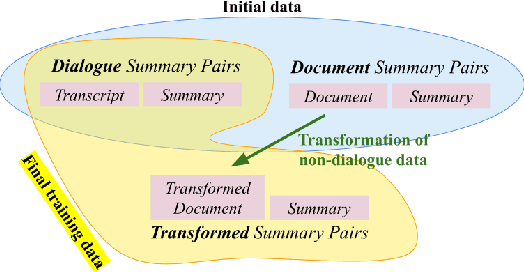

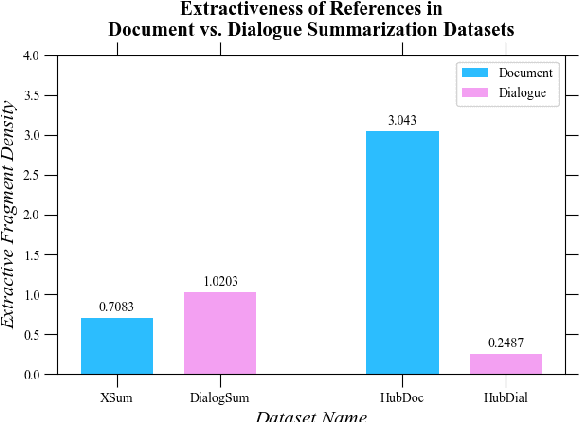

Abstract:To mitigate the lack of diverse dialogue summarization datasets in academia, we present methods to utilize non-dialogue summarization data for enhancing dialogue summarization systems. We apply transformations to document summarization data pairs to create training data that better befit dialogue summarization. The suggested transformations also retain desirable properties of non-dialogue datasets, such as improved faithfulness to the source text. We conduct extensive experiments across both English and Korean to verify our approach. Although absolute gains in ROUGE naturally plateau as more dialogue summarization samples are introduced, utilizing non-dialogue data for training significantly improves summarization performance in zero- and few-shot settings and enhances faithfulness across all training regimes.
Improving Distinction between ASR Errors and Speech Disfluencies with Feature Space Interpolation
Aug 04, 2021
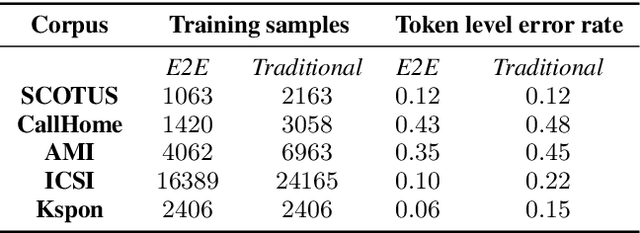
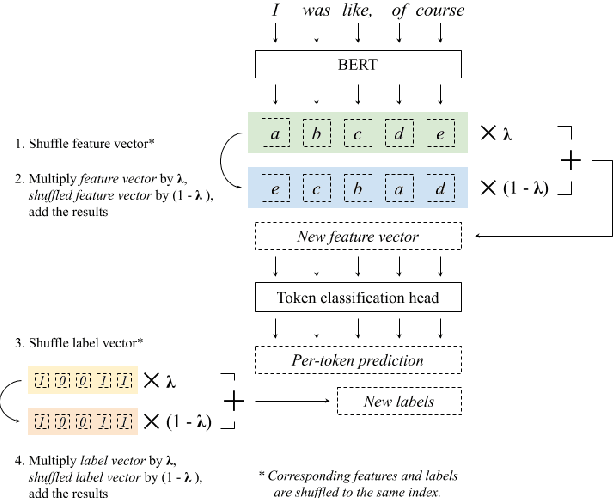
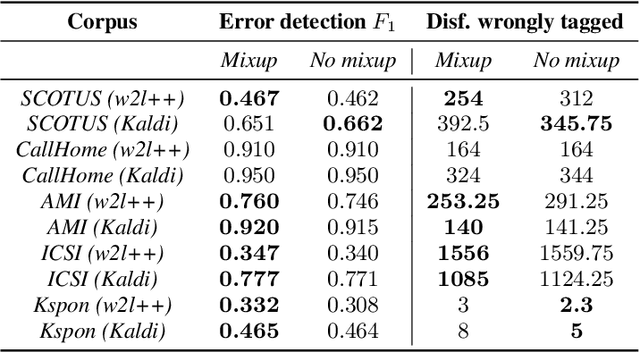
Abstract:Fine-tuning pretrained language models (LMs) is a popular approach to automatic speech recognition (ASR) error detection during post-processing. While error detection systems often take advantage of statistical language archetypes captured by LMs, at times the pretrained knowledge can hinder error detection performance. For instance, presence of speech disfluencies might confuse the post-processing system into tagging disfluent but accurate transcriptions as ASR errors. Such confusion occurs because both error detection and disfluency detection tasks attempt to identify tokens at statistically unlikely positions. This paper proposes a scheme to improve existing LM-based ASR error detection systems, both in terms of detection scores and resilience to such distracting auxiliary tasks. Our approach adopts the popular mixup method in text feature space and can be utilized with any black-box ASR output. To demonstrate the effectiveness of our method, we conduct post-processing experiments with both traditional and end-to-end ASR systems (both for English and Korean languages) with 5 different speech corpora. We find that our method improves both ASR error detection F 1 scores and reduces the number of correctly transcribed disfluencies wrongly detected as ASR errors. Finally, we suggest methods to utilize resulting LMs directly in semi-supervised ASR training.
 Add to Chrome
Add to Chrome Add to Firefox
Add to Firefox Add to Edge
Add to Edge